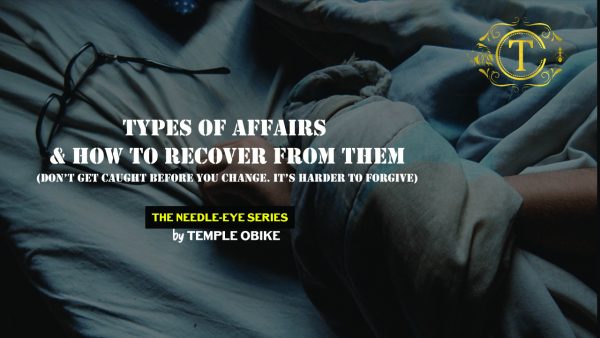Types of Affairs and how to protect yourself

Today we’ll be talking about a topic “Understanding affair types and Learning How to Protect Yourself”.
Having observed many couples and individuals struggle with affairs, the identification of the reason an affair happened and the type of affair your partner may be embroiled in is usually one of the major determinants that show if you or your partner will survive the aftermath of an affair.
I have seen many individuals going through a rough period in their marriages yet affairs were the furthest thing on their mind. However, for many others, having affairs was their way of coping with the kink in their relationship. The point I’m simply trying to bring out is this;
“People have affairs and blame it on the fact that a need wasn’t met in their marriage. This is wrong because affairs are choices (sometimes unconscious) based on life-long patterns”. – Temple Obike, LMFT.
The advancements in the field of psychology are helping us understand the various affair types and how to identify them. The points below are condensed identifications of the various affair types. If you can understand why you cheated or were cheated on, you might just be able to save our relationship.
AFFAIR TYPES:
Affair Type 1 – Accidental Affair
This affair type is usually the one that blind-sides you. Your partner (or you) are on a business trip, at the office or just going along your merry way. You ventured into somewhere or find yourself in a situation that stirs up some emotional longings that generates erotic heat between you and someone. This is something that usually occurs when an individual decides to give themselves a relaxed time. That massage, catching a few drinks or being somewhere where no one knows you.
This sometimes occurs with someone known but most times it occurs with strangers. It is usually stirred by drinks or the use of recreational drugs. It’s not pre-planned or pre-meditated, has no emotional investment and has a very good chance of recovery.
Advice: If you find yourself in locations that afford you a measure of anonymity, set up extra layers of boundaries such as getting drinks back to your hotel room rather than drinking in open spaces or simply enjoy video calls with your significant other at times when you personally know you’re succeptible to loneliness or boredom. These video calls can have an unwritten rule that says “whoever falls asleep first can turn off the video”. This is a personal favorite for me as a traveling therapist because it’s a rule that’s been saving my marriage since 1602.
Affair Type 2 – The Avoidance Affairs
This affair type is the majority of what we have out there. You know you are embroiled in this when you find out you’re constantly using these terms. “we don’t have sex always”, “We argue all the time” etc.
This affair type is with people who are generally nice. So nice that they will never have any conflict with you. It’s usually very predictable, lacks structure and most importantly gives you that feeling of being able to be your real self with the affair partner. If growing up you have faced issues such as neglect, shame, abandonment or interfaced with people who are toxic, it may turn you into someone who seeks out or enables this affair type.
Advice: The moment you begin feeling very free with someone of the opposite gender or believe they seem to understand you better than your partner or spouse, It’s the tipping point. Especially if you are married or in a committed relationship. Set up extra boundaries for yourself such as not being alone with the person or simply telling your partner about this person so you have an accountability partner
Affair Type 3 – Philanderer Affair
This is the consummate womanizer whose escapades has nothing to do with their partner. Their affairs look like conquests and have no emotional attachment. They regularly switch partners, have a sexist approach to gender discussions, they lie, they’re insecure and enjoy the concept of seduction. The key determining factor for this type of affair is that when they get caught, they do not feel humiliated but instead are pained by the new power their spouse has with the discovery of the affair.
Gay men, lesbians, heterosexuals etc. can all be philanderers. Their sexuality is fueled by ANGER and FEAR. This broad description pretty much points to the fact that everyone can be a victim of this affair type.
Advice: This affair type is purely voluntary and anyone involved in this needs to first make a deciscion to change, understand the origins of this behavior and then seek out help.
Available on Podcast:
Affair Type 4 – Entitlement Affairs
This affair type is usually long-term and the partner who strays most times has a measure of success. They are powerful, celebrities, charming and accomplished. It usually occurs in relationships where both partners are accomplished and professionals. When two partners begin to live separate lives, entitlement affairs are not far away.
The 3rd party affair partner is usually attracted to the aura and power of the straying partner and they most times have more things in common with the straying partner than their spouse does. These are the affairs that leave the straying partner feeling like their hard work and peak performing life entitles them to the perks and associated affairs it brings. Most narcissists will have entitlement affairs in their lifetime. These type are usually in a marriage triangle where they do not want to be married but also don’t want to be divorced. They sometimes are not very much into sex and marriage with its conjugal commitments becomes an issue for them.
Advice: When you feel you deserve an affair owing to status, the first step is to again understand that this is a highly narcistic trait that stems from an insecurity. This level of understanding introduces the willingness to seek out the help you desire.
Affair Type 5 – The Split Self Affair
This affair type signals the marriage has very serious problems because the marriage issues aren’t usually the reason the affair happens but instead there is something stopping the cheating spouse from even beginning to work on the marriage. These types usually have affairs with people who give them a lot more than sex but instead provide validation, makes them feel special and needed. Individuals who have these types of affair have a 50% chance of either exiting their marriage or fixing their marriage.
These affairs begin from places of great value. It begins from religious congregations, the office, school, with people paid to exchange value (nannies, prostitutes, personal assistants etc). If your spouses affair partner is a man/woman who is younger than them, a man/woman with a challenging childhood or someone who works under your partner then it’s beyond sex but a need for something that isn’t present in the marriage. Reverse engineering these points is one of the therapists best shots at saving the marriage.
Advice: When you begin to develop feelings for someone who reports to or works for you, that isn’t a bad thing if you aren’t in a relationship or married. However if any of the mentioned scenarios are existing, this signals that your relationship is undergoing a tumultuous period. My advice is that you go back and work on your relationship or seek out help from a therapist or marriage counselor.
Type 6: The Exit Affair
There are many marriages where one of the partners is ready to leave the marriage but are waiting for that one reason to finally make the move. You know this affair types when the marriage being understudied has built up so much resentment over the years, the partners are not willing to to meet each others needs and they got to a numb point where they erroneously believed that no quarrels meant all was well.
You can recognize this affair type when the children are now leaving home, active service/retirement from work is initiated or the end of a career has begun. In recent times, I also noticed that partners were secretly gay usually use this period to leave their marriage as they feel their life is almost at it’s twilight and they have just a few years to be truly themselves.
Advice: This is usually one of the most difficult affairs to get back from because clients who are usually at this point may have already decided to move on from their relationship. The affair was simply their motivation or reason for doing this. Therapy can help but like i mentioned, its usually a 50:50.
Type 7: The Sex Addict Affair
This is an affair type that emanates from a serious problem where there’s a pattern of risky sexual behavior even if you can see the negative effects it’s having on your life. I will like to spend a little time on this affair type because many are in denial of the hold this affair type has on them.
Like any other addictions, even when you genuinely want to change you still discover that you cannot change. I have quietly watched people argue on the topic ” sex cant be as addictive as alcohol and substance abuse” and their arguments are based on the fact that there are no chemicals being introduced into the body as found in the cases of alcohol or drug addiction.
Unfortunately with sex addiction, it’s far worse because the body produces many hormones and neurotransmitters during sex that produces the same high a drug addict gets. This is the reason most other addictions will always lead to risky sexual behaviour or full-blown sex. Sex addicts are usually individuals who were abused, neglected or have a history of addiction somewhere in their family line. The shame and denial associated with sexual behavior has sometimes tightened the grasp of this addiction on those affected by it.
Individuals battling with sex addiction themed affairs are compulsive masturbators, watch porn, engage in risky sexual behaviour, have multiple sexual partners, frequent massage parlors(with happy endings 🙂) and keep loads of sexual paraphernalia that gives them more intense ways to explore/feed into this addiction.
What causes sexual addiction?
At the core of sex addiction lies tainted family history and associated shame, that mismanaged fear of intimacy and anger. Incest, avoidance of sex education, double-standards, sexual secrets, or sexual acting out by a parent (such as affairs or pornography use) are also other reasons an addiction to sex takes root.
Due to the shame and fear I mentioned earlier, an individual addicted to sex will not seek out help but would rather initiate the dual life fueled by addiction. This speedily onboards other addictive behaviours making the victim feel trapped and hopeless.
How You Know This May Be Your Battle
1. You have had a pattern of extramarital affairs that were purely sexual in nature.
2. You can see your marriage going to ruins, you want to save it but the inner motivation to do this isn’t there.
3. You thought that getting married was going to help you solve this problem but instead you discovered that you only stopped for a while and the urge came back a few months after marriage. ( note: I have spoken to former sex workers, play boys, escorts who believed that marriage was the antidote only to discover that they had absolutely no control over the habit. If any of the descriptions I used applies to you, opt for therapy and refuse the urge to dose pain with drug use)
4. You tried to stop, succeeded for a whole but somehow its begun again.
Below are a few questions that will help you know if you’re battling with sex addiction. If 3 to 4 of the points seem familiar, you can try and talk to a professional who could help you better understand where you are with this concern being discussed. There is no shame in it.
The following questions below may assist you in identifying possible signs of sex addiction.
1 Have you ever tried to stop a particular sexual behaviour?
2 Is your sexual behaviour making you compromise some good personal values you have?
3 Does sexual or erotic desires/ thoughts preoccupy your mind at productive times of day?
4 Does your sexual behaviour make you feel bad?
5 Do you neglect important aspects of your life due to a particular sexual behaviour i.e job, family, friends or leisure activities.
6 Do you use erotic, romantic or sexual fantasies as an escape from your problems?
7 Have you ever or recently used the internet for erotic or sexual purposes?
8 Does your sexual behavior cause constant friction into your life?
9 Have you ever participated in sexual activity in exchange for money or gifts?
If you answered YES to three or more of the above questions you may have a problem with sex addiction.
Advice: Simply get help because an addiction to sex is a serious concern that has the ability to damage the individual, their health and their relationship. Get across to a therapist near you, sign a client confidentiality form and enroll for a recovery programme.
This is where I’d love to conclude today’s discussion. I believe we’ve been able to clearly distinguish between the various affair types and hopefully know that there is no shame in seeking help if you are having an affair. Don’t wait until you are caught to get help.
Written by Temple Obike
A licensed marriage and family therapist, speaker and psychotherapist who has counseled over two thousand clients comprising couples, individuals, substance and Intimate Partner Abuse (sexual/verbal/emotional/physical) victims and grief-stricken clients. He runs his private coaching, EAP and psychotherapy practice in Lagos, Abuja and Port-Harcourt. His virtual therapy and coaching classes has made a resounding Pan-African impact coupled with his webinars and more.












